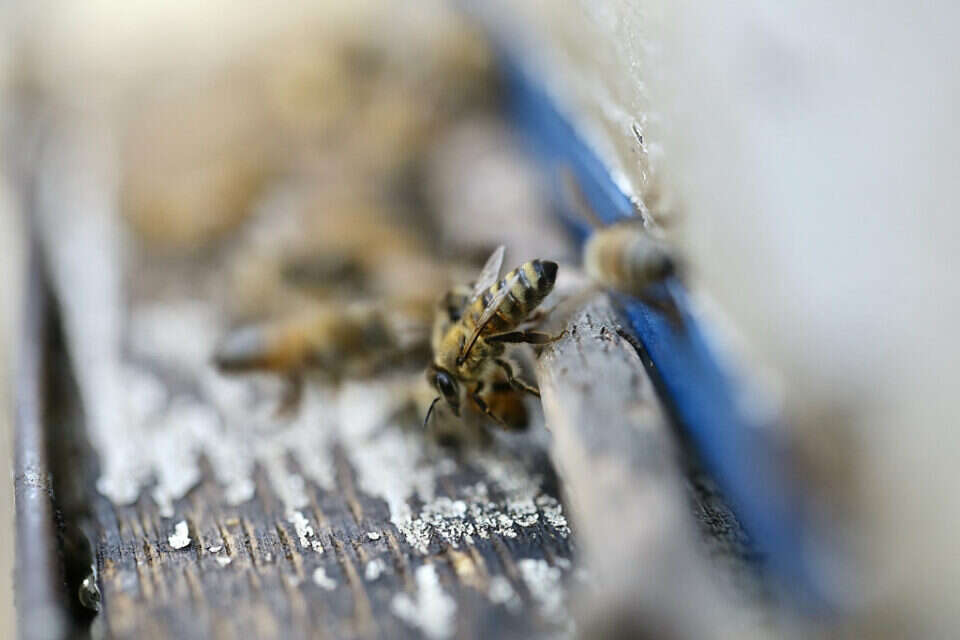Against the background of the climate crisis and the World Conference in Glasgow: The
Knesset will be the first government office in Israel to establish a municipal center for bees, as part of which two special beehives that grow naturally will be placed next week in the courtyard of the archeological garden within the Knesset.
This is an environmental initiative adopted by the Knesset, inspired by parliaments around the world, as part of a global initiative that has reached the roofs of the German parliament, the City of New York, the Vatican, the Oslo Opera House and more.
On the honey
Why bees?
Well, it's hard to overstate the importance of bees to the world.
They are responsible for 75% of the plants' pollination processes, and without them the damage to the plant industry and the global food supply would be unpredictable, since bees are responsible for about 40% of the world's food yield.
Interestingly, in recent decades the bee population has been declining, especially in Western countries.
Apparently, among the causes of this alarming phenomenon are an increase in diseases affecting bees, widespread use of pesticides, shrinking agricultural land, global warming, rising radiation, and the cultivation of bees from cultured animals that push the legs of wild bees.
In light of the extinction of bees, many initiatives have been created around the world with the aim of helping the disappearing bee population to recover, and increase awareness of their importance to the environment and our lives.
Beekeepers at work.
archives.
In recent decades, the bee population has been declining, especially in Western countries, Photo: Eyal Margolin - Ginny
On the sting
The Knesset said that the beekeeping in the Mishkan will be carried out in accordance with the principles of biodynamic beekeeping, which is different from industrial beekeeping.
The honey, which is the food of the bees, did not come down.
In this approach, emphasis is placed on the health of bees and the strengthening of their immune system, with the intention that raising genetically strong bees will help their distribution in Israel.
The Knesset's gardening team will plant in the vicinity of hives dedicated plants that will support the bees (after the year of the shemita).
"The Knesset, which also serves as a visitors' center, plans to include the issue in the training programs, and especially in 'green tours' that emphasize to visitors the activities that the Knesset promotes, being a leading parliament in the environmental field," Tamar Bar-On, head of quality, told Israel Today The environment in the Knesset.
"Fascinating environmental move"
The project will be operated in cooperation with Yossi Od, who is leading the project to return the bees to the city and environment in Israel.
Among other things, he founded the "Red Bee Shield" organization and founded and operates the six centers for urban beekeeping in Israel.
He said, "Beyond the great importance of spreading the bees, their contribution to normal natural processes and our food security, I am excited time and time again to see how visitors are initially reluctant and afraid of bees, at the end of the training and meeting. "Suddenly to a friend. This is an opportunity to change the stigma in a broad sense, in order to accept the other. It can be a first step, through the process and change in the visitors' relationship with the bees, to instill a new relationship between a person and his friend in our society and culture."
The bees will be raised in the Mishkan in accordance with the principles of biodynamic bees, archive, Photo: Oren Cohen
Ode explained to Knesset members who feared bee stings that a bee that grows naturally does not see man as an enemy and therefore does not attack.
Despite the alleviation of the concerns, the Knesset clinic is prepared to treat an allergic reaction in the event of a bite.
Bar-On noted that "the Knesset of Israel strives to be a leading parliament in the field of sustainability. Along with important moves we are making in the areas of energy efficiency, waste reduction and environmental risks, it is also right to promote projects to strengthen urban nature, especially in the heart of the Knesset." "Many animal species, and it can be an example of the integration of proper urban development with natural values in the heart of the city."
Knesset Director General Gil Segal told Israel Today that "this is a fascinating environmental move with an important and significant message for the strengthening of urban nature in Israel.
The depletion of the world's bee population is a warning light for all of us.
"The climate crisis has taught us about the damage that humans have created over the years to the environment, so the Knesset will continue to expand its activities in the environmental field, promote innovative projects and integrate sustainable conduct into its work routine to continue to be the leading parliament in the environmental field."















